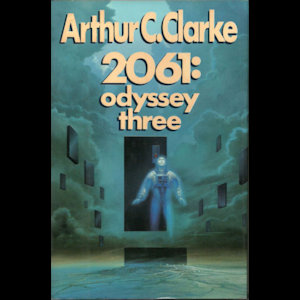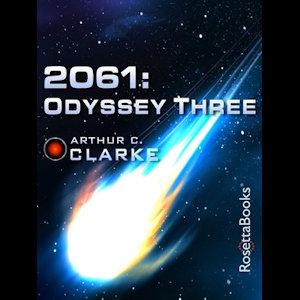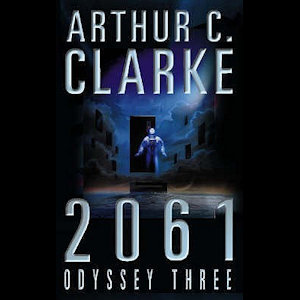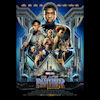The Summer of Arthur C. Clarke: 2061: Odyssey Three
Before I begin, welcome to my Summer of Arthur C. Clarke. On the heels of last year's popular Slasher Summer, this year I'm leaving behind the guilty pleasure of the niche horror genre and exploring something a little closer to my own heart: namely science-fiction. Of all the sci-fi greats, none have influenced me more than the late Arthur C. Clarke, my personal favorite of the "Big Three" from the Golden Age of the genre (Asimov, Clarke, and Heinlein). This summer, I am going to look at a few of his most famous works, including the entirety of his 2001 series and the tiny handful of adaptations that have been made for film, television, and video games. Strap in and prepare yourselves for a journey into the stars and the mind, and let us never forget how much richer the world of fiction is for having been blessed by the incomparable Sir Arthur C. Clarke.
 | | You'd think, with Bowman and HAL both on the cover, they'd be in the book for more than five pages |
It's been over fifty years since Jupiter became Lucifer, our solar system's second sun. Heywood Floyd, now over a hundred years old, is taking a trip to visit Halley's comet, while a young scientist has dicovered something improbable on the surface of the forbidden Europa. When Floyd's grandson is part of a crew that crashes onto the oceanic surface of that newly christened planet, Heywood and his team of scientists must rush to save them, hoping against hope that the originators of the monolith will let them attempt a landing and possibly risk the alien evolution taking place in its depths.
Clarke elaborates on a few particularly interesting ideas in 2061: Odyssey Three, but they never quite gel into a story of their own. He clearly wants to write something about the return of Halley's comet, scheduled for 2061, and he wants to revisit the evolving Europa he introduced audiences to in 2010. Unfortunately, these two stories simply aren't related to one another, and the attempt to connect them feels horribly contrived and convenient, especially given the inclusion of not one but two Floyds.
As science-fiction, there's a lot to appreciate: returning to the idea of Jupiter's core being made of diamond, visualizing the interior of Halley's comet and what a manned mission to its surface might be like, imagining a future of space travel that is far more luxurious (there's a zero-gravity pool!), etc. The book is at its most interesting during the sections when Galaxy has landed in the oceans of Europa and two of its passengers set out in a shuttle to explore. Here, Clarke's imagination and attention to detail really shine and offer a setting with endless potential.
 | | A better cover--in that it is more related to what's actually in the novel--but it's kind of generic |
Unfortunately, as a novel, it's a bit of a mess. There's no clear protagonist; the plot meanders aimlessly before settling on a central problem; we are given too much background information on ancillary characters who don't even appear in the central narrative (such as Lawrence Tsung, the relatively uninteresting philanthropist behind both missions); and there are several digressions involving future politics that are more boring than the politics of the preceding books, all to set up a quick and wonky plot beat that only serves to get Galaxy onto Europa in a convoluted way.
In addition, Clarke's writing style feels oddly rushed. His descriptions aren't as vivid, and some sections--like the beaching of the Galaxy--read as though Clarke is just trying to get on with it. It's almost impossible to envision the twin spacecrafts of Universe and Galaxy, as Clarke never gives them a proper description, and it's thus impossible to follow the rushed explanation for how the Galaxy is put onto the shore of a Europan island, especially when he drops in as weird afterthoughts things like the sea anchor that had been prepped beforehand without the reader being told about it, described dismissively in one sentence and then never mentioned again.
It's also lacking the weight of both 2001 and 2010, only giving us the briefest of interludes involving the Star Child, and that at the very end as what is essentially a postscript. It doesn't concern itself with the nature of consciousness or exploring the greater mythos Clarke created. Even the big reveal of the mountain-sized diamond feels pretty unremarkable when the previous book climaxed with Jupiter being turned into a star. Honestly, this would have been better as a much bigger story with greater ties to its predecessors, or as two different stories unconnected to the 2001 universe.
 | | There also aren't that many monoliths |
His characters also suffer. There is an earnest attempt to stuff several engaging people into the story, but in the end, few if any are memorable. Even Heywood Floyd, so great in 2010, is a bit stuffy and uninteresting this time around, and he almost never drives the action, even when other characters give him undue credit for doing so. It's also never really explained why Bowman and HAL feel the need to "copy" him in the end, seeing as how he brings nothing to the table that Bowman himself doesn't already possess as the Star Child. (Floyd is also completely MIA in 3001.) The only side character with something to offer is the science popularist and media darling Victor Willis, a Carl Sagan type (or, for younger readers, a Neil deGrasse Tyson type) to which other scientists have varying and interesting reactions to. Unfortunately, he doesn't do much either and is only present in a handful of scenes.
All of this--the meandering plot, the less interesting politics, the science overtaking the narrative, the jumble of characters too numerous to develop properly, etc.--is reflective of much of Clarke's later works, and it's a pattern we'll see again. As a science enthusiast, I don't want to criticize the heavier emphasis on real-world developments and nifty extrapolations on legitimate research, but as a fan of narrative fiction, I'm appalled that any writer of Clarke's caliber could forsake plot structure and character development so readily.
Around the turn of the Century, Tom Hanks was heavily involved in an attempt to adapt 2061 and 3001 to the big screen. There are elements of 2061 that could make for a good movie--it would at the very least be a visual treat--but the novel would need to be tinkered with pretty heavily to become a workable screenplay. That project fell through, but now the Syfy Channel might be working to adapt 3001 into a miniseries. I'll talk a little about that next week, though, after we look at the Final Odyssey.
-e. magill 6/28/2018
THE UNAPOLOGETIC GEEK'S
SUMMER OF ARTHUR C. CLARKE: | |
|
| MORE LIKE THIS: |

|
The Movies of 2018
The Geek reviews a ton of movies this year, including Black Panther, Ready Player One, A Quiet Place, Hereditary, The Predator, Venom, and Aquaman. [12/27/2018]
|
|
|
|
|